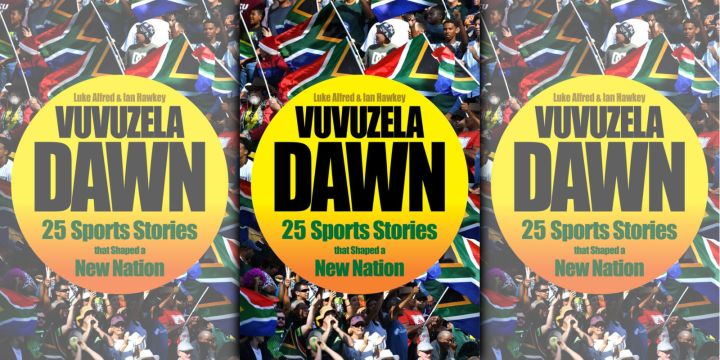Maverick Life – Books
Luck, sliding-door moments and personality clashes: Ian Hawkey on his new book on 25 years of SA sport

Lucas Radebe calls it ‘a fresh spotlight on an exhilarating journey’. Vuvuzela Dawn: 25 Sports Stories that Shaped a New Nation tells the story of South Africa’s return to the sporting stage, revealing the drama and passion that defined a quarter century. Co-author Ian Hawkey sat down with The Reading List to tell the story of the book.
The Reading List: Did you notice any differences in outlook between the sportspeople you interviewed in the first half of the book, people like Vuyani Bungu, Penny Heyns or Jerry Sikhosana, and the younger sports heroes?
Ian Hawkey: We did. Successful sportspeople tend to be very absorbed in their short and medium-term targets. Once they leave that behind, they develop perspective, see the context. The individuals involved in sport in those immediate, post-democracy years – like Vuyani Bungu, Penny Heyns and Jerry Sikhosana – look back very wisely at how wide-eyed they, and much of the country, were at the time. And they describe it really vividly.
TRL: Sport is inexorably linked to politics, especially in South Africa. You write about the “gossamer-thin political consensus” in the country ahead of the 1995 Rugby World Cup, when Kobus Wiese recalls the country as being “on a knife edge”. Do you think our sporting history has had an effect on our advancement as a nation?
Ian Hawkey: Absolutely it did. And in many ways, it was put under a political obligation to function that way. Sport had been such a powerful and mostly effective tool in the sanctions against apartheid South Africa: the bans on international competition through the 1970s and 1980s; and in 1992, participation in the cricket World Cup was presented explicitly as a lure to the white electorate to endorse democracy. That was the background. And of course, sport, particularly team sports, were and are such a clear touchstone for issues of representation and meritocracy. It is also probably the area of public life where people feel most free to be openly, joyfully patriotic.
TRL: Our sports memories are often our fondest, both on a personal and national level, but at the same time memories can be misleading. Were you surprised by how any of your research or interviews contradicted what you thought you knew about events?
Ian Hawkey: Many times, yes! I think we like to imagine that great successes come about according to a well-thought-out plan or strategy and, in the immediate aftermath, we cling to that narrative. The reality is also made up of arbitrary strokes of luck, sliding-doors moments, personality clashes, and so on. You go back to, say, the tied cricket World Cup semi-final of 1999, and the more you learn, with 20 years of distance, about the apparent freeze of nerves that stopped South Africa winning against Australia, you discover that, far from being ice-in-their-veins experts, the Australians were in a state of escalating, disabling panic, too. They just got away with it.
TRL: Like the musical instrument mentioned in the book’s title, Vuvuzela Dawn, the book itself contains stories that South Africans will both love and loathe. Why did you decide to include some of our sporting low points in the book?
Ian Hawkey: Because they defined our sport, and quite often shone a light on things beyond sport. Incidents like Kamp Staaldraad had an enduring resonance; the Hansie Cronje match-fixing revelations likewise; and I think to a degree we are still looking back over our shoulders at events like those with a feeling of wariness, worried about how brittle things might be.
TRL: In a way, the book’s chapters follow the trajectory of post-94 South Africa: “Honeymoon”, “Innovators”, “Hard Times”, “Celebrating Afresh”, and “Higher, Faster, Longer”. What do you think, or hope, the next chapter will be titled?
Ian Hawkey: Of course, I’d like to say, “Top of the World” or something like that. Actually, what we have ahead of us very soon are some big chapters, in terms of challenges. The state of South African sport generally will be judged on what happens between June and November this year: there’s a cricket World Cup, overlapping with Bafana Bafana at the Africa Cup of Nations, both tournaments where the national teams have not met expectations in the last two decades. Then a rugby World Cup, starting in September.
TRL: There’s something almost quaint or naive about some of the stories you tell from the 1990s. Penny Heyns, for instance, recalls how during the Barcelona Olympics in 1992 a team doctor advised them to take Corenza C for the flu, which resulted in them briefly testing positive in a doping test. Do you think this ingenuousness played in South Africa’s favour in those sporting successes from early democracy?
Ian Hawkey: Definitely. My co-author, Luke Alfred, puts this very elegantly, when he says that a great virtue of South African sportspeople on the international stage in the immediate post-1994 period was they did not know what it was like to lose in major competitions. You can call it naïveté, but there was a fearlessness there.
TRL: There are some lovely little obscure titbits for sports fans in the book – Hansie Cronje being mistaken for Pete Sampras at Wimbledon in 1995, or All Blacks Zinzan Brooke and Josh Kronfeld playing guitar and singing mournful Maori songs in the dressing room after their loss in the 1995 World Cup final being among those that will make readers smile. What were some of the best bits of trivia you uncovered?
Ian Hawkey: That was certainly one of the pleasures of being able to do in-depth research and have long conversations with people. Sizwe Ndlovu, who was in the lightweight rowing crew who won a gold medal for South Africa at the 2012 Olympics, told us how his relationship with the water began as a boy: he used to plunge in from the edge of dams near his home in KZN, having tied empty two-litre milk cartons around his waist to keep him afloat. I very much enjoyed Hannes Strydom’s self-medication during the 1995 Rugby World Cup: his tournament looked like it might be over when he needed 34 stitches on a gash to his face. His rehab consisted of coating the wound with an egg white and holding a steak on it to draw out the swelling. It got him cleaned up enough to be back in the team by the semi-final.
TRL: The book ends with a piece on Caster Semenya, although many would argue her chapter is far from over. What do you think the future holds for arguably our most popular and well-known current sports star?
Ian Hawkey: Caster has had a brilliant career, and 10 years at the very top of such a competitive discipline is heroic. And that’s before you even think about the courage and dignity she has shown away from the track. What I hope is that, long-term, she is remembered as a great athlete far more than as an object of scrutiny.
TRL: Vuvuzela Dawn is, in some ways, a commemoration or “Hall of Fame” of South African sport. If we did have a Hall of Fame, who would be the first person you’d nominate to be included?
Ian Hawkey: Josia Thugwane, I think. His marathon gold medal in the Atlanta Olympics, South Africa’s first Games in the democratic era, was such an exhilarating moment. The race itself was close, he had come to it after some brutal setbacks in his preparation, and it was the marathon, a signature event at the Olympics and for South Africa, where long-distance running has such a fundamental place in the culture. ML
Visit The Reading List at readinglist.click for South African book news daily.


















 Become an Insider
Become an Insider